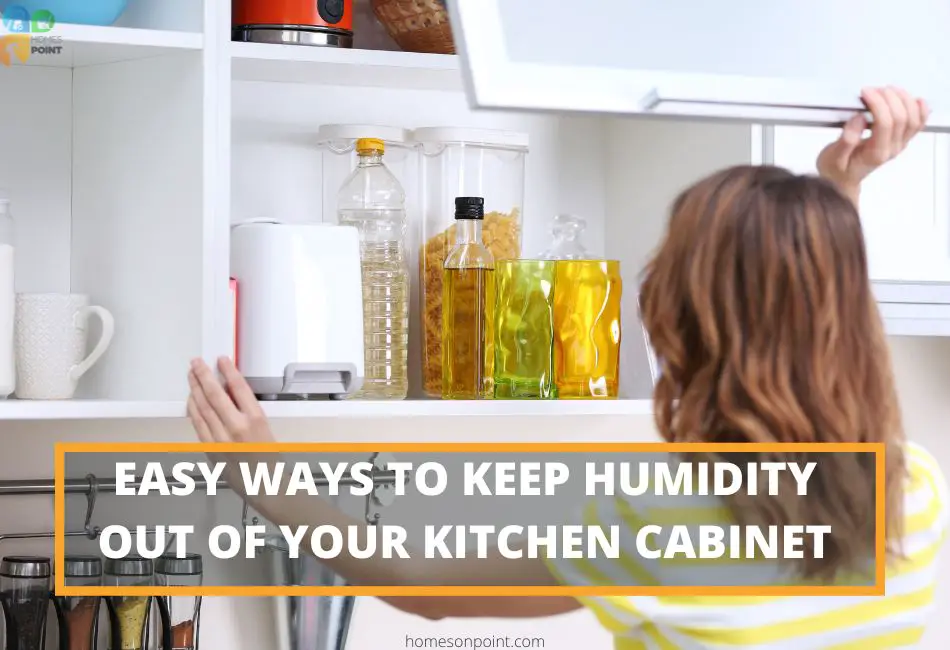If you perceive a stuffy odor in your kitchen cabinets, there is likely too much humidity in there. That smell is not only unpleasant but can also lead to some health problems. Whether your kitchen cabinets have doors or not, they can be affected by humidity so it is essential to know how to keep that moisture out of your kitchen cabinets.
You can do that by following some budget-friendly or cashless simple ways. The surest way to keep humidity out of your kitchen cabinets is to ensure that the insides are always dry. Read on to know certain specific ways to do that.
Does Humidity Affect Cabinets?
High levels of humidity can affect your kitchen cabinets. Though it takes time for the effect to be visible, it will cost you some money to get it fixed. Below are the effects of humidity on your kitchen cabinets.
1. Humidity Can Cause Rot In Your Kitchen Cabinet
High levels of humidity in your kitchen cabinets can lead to rot. Most kitchen cabinets are made from natural wood or compressed wood board or plywood, hence, once it begins to rot, it starts to get eaten away.
Rot caused by humidity in your kitchen cabinets will damage them. This will mean changing your cabinets and that will cost you money. If you do not want this to be your story, then keep humidity out of your cabinets.
2. Humidity Breeds Microorganisms
Microorganisms need moisture and the dark to grow and thrive. Kitchen cabinets can create that perfect environment. Since cabinets are already dark on the inside, adding moisture in there will serve as a breeding ground for mold and mildew.
If detected early, the mold problem can be solved. However, if left to keep growing, it can cause a lot of diseases to the occupants of the household.
3. Humidity Can Cause Swelling
High levels of humidity can cause your kitchen cabinets to swell. The absorption of moisture into the wood and more specifically, the cabinet doors will cause them to swell up. This swelling will make it difficult to close the cabinet doors and make the hinges squeaky.
Even if the swelling eventually decreases, it will leave a bloat in your cabinet doors, making them unsightly.
4. Low Humidity Can Cause Shrinkage
As much as high levels of humidity can be problematic for your kitchen cabinets, low levels of humidity are also not ideal. When the humidity in your cabinets is low, it can cause your cabinet doors to shrink. This shrinkage will make the hinges of the door loose and is likely to make the screw or nails fall off. Also, the doors of the cabinets will not be closing properly as they will be wobbly.
What Causes Moisture In Kitchen Cabinets?
After discussing the effects of humidity in kitchen cabinets, it is only right that we talk about what causes humidity in kitchen cabinets.
1. The Weather
Seasons and the weather can cause the buildup of moisture in your kitchen cabinet. Depending on where you live and what the weather conditions are, your kitchen cabinets may be less or more prone to humidity.
In cold areas, there is less humidity, translating to low levels of humidity in your kitchen cabinets as well. If you find yourself in a hot climate or season, you will most likely experience high levels of humidity and that can affect your kitchen cabinets too.
2. Clustered Items in The Kitchen
If your kitchen cabinets are overcrowded with items, there will surely be a buildup of moisture in there. The clutter won’t allow the free flow of air around the items in the cabinets. This poor aeration will cause heat, which will in turn cause an increase in humidity in the kitchen cabinets.
Unlike the weather, which we do not have control over, you can declutter and rearrange the items in your kitchen cabinets to prevent humidity.
3. Bad Aeration
Stemming from the previous point, apart from items being cluttered in your kitchen cabinets, if the cabinet was built in such a way it doesn’t allow air circulation, it can cause moisture buildup.
So, as much as it is important to reorganize the things you store in your kitchen cabinets, you are also advised to opt for designs that allow some amount of air circulation because poor ventilation in your kitchen cabinets can cause moisture in them.
4. Dump Shelves and Items
If the shelves in your kitchen cabinets are always wet, that is likely to cause a humid environment in your cabinet. Therefore, if you clean your kitchen cabinets, make sure they are completely dry before arranging any items in them.
Also, if you store wet items, especially utensils, in your kitchen cabinets, you are likely going to cause moisture to get locked up in them.
How To Keep Humidity Out of Your Kitchen Cabinets?
Now that we have established how humidity affects our kitchen cabinets, let us look at some cost-effective ways to keep it out of our cabinets.
1. Keep Your Cabinet Shelves Dry
The cabinet shelves are the starting point. Your cabinets are less humid when you ensure the shelves are completely dry before arranging any items in there. So, after you clean your cabinets, for instance, ensure that the wood does not feel damp when arranging those items in them.
2. Keep Your Items Dry
Even if your cabinet shelves are dry, also ensure that the items you will store in there are also completely dry. Never store damp items in your kitchen cabinets as that will only make your cabinets a conducive place for humidity to thrive.
3. Don’t Overcrowd Your Cabinets
I know that if you have a lot of items to store in your kitchen cabinets, the temptation to over-pack them is high. However, overcrowding your cabinets will prevent the free flow of air among the items.
Therefore, no matter how many items you have to put away in storage, do not stuff all of them up in your kitchen cabinets.
4. Ensure Good Ventilation
Even if you do not pick from or return things to your kitchen cabinets, you have to be opening your cabinet doors from time to time. This will allow air into the cabinet thereby keeping humidity out of it.
5. Develop A Cleaning Culture
Most of us keep buying new things and stacking them in our cabinets throughout the year. Obviously, with time, the arrangement of items in the cabinets will be disorganized. So, apart from the fact that organized kitchen cabinets are sightly, they will also keep humidity out of your cabinets by allowing air to flow freely through the cabinet.
6. Line Shelves with Paper
This is one trick my grandmother used to do. To keep humidity out of your kitchen cabinets, you can line with cabinet shelves with old newspapers or paper towels. The paper will help absorb moisture in the kitchen cabinets. You however need to change the paper regularly they will also get dirty and worn out over time.
7. Use Desiccants
Desiccants maintain a state of dryness in any space and there are quite a number of them you can use in your kitchen cabinets to kick the humidity out. Silica gel, charcoal, camphor balls, rock salt, and dried neem leaves are examples of desiccants that can be used to keep humidity out of your kitchen cabinets.
Just put any of them in a small bowl or basket and leave them in the cabinets. You must however remember to change them once in a while.
8. Regulate Humidity In The Kitchen
Yes, the humidity in your kitchen can affect that in your kitchen cabinets. So, ensure that your kitchen is between 40 to 50% humid to keep humidity out of your cabinets.
In cases where the weather or season makes it difficult to maintain acceptable levels of humidity, you can use the air conditioner or exhaust fan to regulate the humidity in the kitchen.
Also, open windows daily to allow fresh air and sunlight when necessary.
What Is the Best Humidity for Cabinets?
The best humidity for your kitchen cabinets is between the ranges of 40 to 50%. Remember, if the humidity in your kitchen cabinets falls way below this range, which is a low level of humidity, it can cause your cabinets to shrink. Also, extreme humidity, which may be as high as 80% can cause your cabinets to swell.
Conclusion
It will not cost an arm and a leg to keep humidity out of your kitchen cabinets. While some of the methods do not require money, others are inexpensive. From regulating the humidity in your entire kitchen to using desiccants to ensuring that your shelves and items are completely dry, you can keep humidity at bay in your kitchen cabinets.

